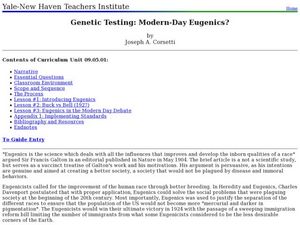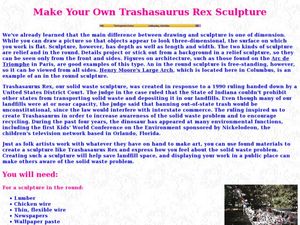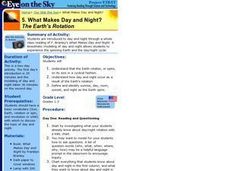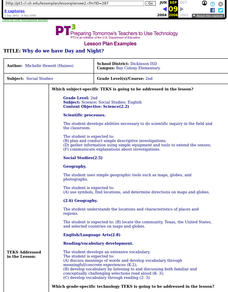Curated OER
Lesson 2 Its a Small World (Day 2)
Students are able to explain how the water cycle recycles the earth's water supply. They are able to make use of the knowledge of land forms learned in social studies. Students are able to form a hypothesis on how/why the water cycle...
Curated OER
Watershed Lesson Plan
Students are introduced to the concepts of a watershed, stream flow and water quality. This five-day plan is an excellent way to introduce students to the concepts involved. They create their own watershed using a paper bag, water and...
Curated OER
A Day In My Life
Students brainstorm how they can conserve energy in their daily lives. In this energy lesson plan, students discuss how they use energy and ways to conserve it.
Curated OER
Genetic Testing: Modern-Day Eugenics?
Students trace the history of the development of Eugenics. In this social studies activity, students read and analyze a real life case. They write a paper about what they read.
Curated OER
Minerals of the Earth
Students learn and practice identifying Earth's minerals and their properties. Working in small groups, they evaluate minerals. This is a well-described lesson, which students enjoy.
Curated OER
How Many Days Are in a Year?
Students create a calendar for an imaginary planet. In this earth science lesson, students analyze the errors on the different calendars used on Earth. They present their work in class.
Curated OER
Environmental Fair
Students investigate environmental issues. For this environmental lesson, students find an object that is considered trash and make something useful out of it. Students present their creative project.
Curated OER
Sunrise, Sunset: Quickly Go the Days
Students explore the concept of daylight. For this daylight lesson, students compare the amount of daylight on a particular day in Anchorage compared with daylight where they live. Students color maps of the US according to amount of...
Curated OER
Make Your Own Trashasaurus Rex Sculpture
Students explore environmental awareness through reusing materials. In this environmental awareness lesson, students use trash to create a "trashasaurus," a large dinosaur sculpture made from waste. Detailed structure and papier-mâché...
Curated OER
Who Will Care for the Water?
Students discover how humans impact natural resources. In this environmental lesson, students identify water resources in the local area and construct a T-chart to compare the positive and negative effects humans have on water resources.
Curated OER
Rocks and Minerals
Take young geologists on an exploration of the collection of rocks and minerals that we call Earth with an upper-elementary science lesson. Through a series of class discussion and hands-on investigations, students learn about the...
Pulitzer Center
Extractive Industries
Here is a chance for environmental studies classes to take a critical look at crises occurring around the globe by reading articles and viewing video clips. The human activities under scrutiny are the extraction of oil, logging, and...
Laboratory for Atmospheric and Space Physics
Planetary Distances on the Playground
There's no need to stay inside; get out of the classroom and create a scaled map of the solar system on your playground field! In collaborative groups, scholars identify the distance between the sun and other planets, place planet...
Space Awareness
History of the Universe
Your pupils may believe that you and their parents are the oldest things in the universe, but surprise! There are elements of the universe that are even older. Elementary scientists create a class timeline to demonstrate the...
Space Awareness
Oceans as a Heat Reservoir
Oceans absorb half of the carbon dioxide and 80 percent of the greenhouse gases released into the atmosphere. Scholars learn how and why the oceans store heat more effectively than land and how they help mitigate global warming. Pupils...
UAF Geophysical Institute
Carbon Footprint
Your young environmentalists can calculate their carbon footprint and discuss ways to reduce it with a worksheet about climate change. After reading a handout about what impact one's carbon footprint can have on the environment, kids...
Curated OER
Don't Let the Earth Down
Writing a persuasive argument starts with a clear thesis. Using this resource, your class will write a persuasive paper on a conservation issue. They will then transform their argument into a 30-second public service announcement. If...
Curated OER
Don't Let the Earth Down
Although recycling is definitely beneficial, reducing our waste and conserving our natural resources should really be the focus of environmentalists. Encourage the future generation to create a public service announcement about a...
Curated OER
How Big Are Earth, Sun, and Moon?
Third graders draw what they believe is in space on a dry erase board. In groups, they are given a beaker half filled with water and they add a teaspoon of oil, observing the different layers that form. To end the lesson, they identify...
Curated OER
What Makes Day and Night? The Earth's Rotation
Pupils discover that the Earth rotates on its axis in a cyclical fashion. They examine how this rotation results in day and night.
Curated OER
Let's Think About Day and Night
Students explore day and night and the relationships between the Earth, the sun and the moon. They discuss the ways in which the sun and moon help us. They watch a short video that helps illustrate these concepts.
Curated OER
Why Do We Have Day And Night?
Second graders demonstrate knowledge and appropriate use of hardware components, software programs, and their connections. After a lecture/demo, student groups utilize raisins and apples to demonstrate day and night. They put togethre a...
Curated OER
The Changing Earth
Students explore the Earth's crust. In this earth science lesson, students participate in 2 activities that demonstrate physical and chemical weathering. Students also play Jeopardy with topics including volcanoes, earthquakes,...
Curated OER
Earth's Tilt Creates Seasons
Pupils examine how the Earth's tilt creates the seasons. In this seasons lesson, students study a diagram that shows the rotation of the earth around the sun and how it tilts during the rotation. They answer 4 discussion questions and...

























